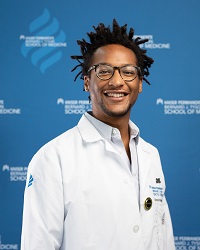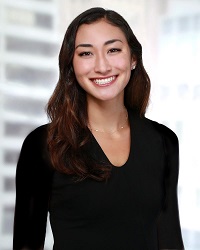Editor’s Note: The opinions expressed in this article are those of the author and do not necessarily reflect the opinions, positions, or the polices of the AAMC or its members.

Alex Martin
Undergraduate: New York University
Major: Global Public Health and Sociology
Medical School: Kaiser Permanente Bernard J. Tyson School of Medicine
Anticipated Graduation Year: 2024
Bio: Alex Martin is second year medical student from Philadelphia, PA who attends the Kaiser Permanente Bernard J. Tyson School of Medicine. After graduating from NYU in 2016 with a double major in Global Public Health and Sociology, he worked for 4 years in the pharmaceutical tech industry while also completing a post-baccalaureate program.

Ariel Silverman
Undergraduate: Brown University, Class of 2019
Major: Health and Human Biology: Brain and Behavior
Medical School: Kaiser Permanente Bernard J. Tyson School of Medicine
Anticipated Graduation Year: 2025
Bio: Ariel is currently a first year medical student at Kaiser Permanente School of Medicine. She grew up in the Los Angeles area and attended Brown University as an undergraduate. At Brown, she studied health and human biology, while taking many classes in anthropology and the arts. She also ran on the varsity Track and Field team. Prior to medical school, she spent time working as a management consultant focused on Healthcare Systems and Services.
Why did you decide to apply to your medical school?
Alex: One of the major reasons I chose to apply to Kaiser was because of the scholarship incentives the school offered its students. As a non-traditional student faced with debt from my undergraduate degree, the opportunity to complete medical school without any additional debt was life changing and something I could not pass up. In addition to the free tuition and housing stipend, I also felt as though Kaiser was a medical school that truly embodied their mission of equity, inclusion, and diversity (EID). As I was researching medical schools, though many schools spoke about a commitment to improving EID, I wanted an institution that is currently reflective of the diverse tapestry of the country, and felt as though Kaiser was exactly that.
Ariel: When I first heard that Kaiser Permanente had started a medical school, I was really excited. Having grown up as a California native, I had long been familiar with Kaiser Permanente’s strong models of preventative care and their focus on both patient and physician wellness. After learning more about the school’s dedication to health equity, social determinants of health, and hands-on learning, I realized that it would be a good fit for my goals. Reading more about the mission, vision, and curriculum along with meeting inspiring faculty solidified this for me. I also loved the idea of gaining medical experience near or within the community in which I grew up, while simultaneously working with a diverse population of patients. So far, the early immersion into clinic as well as the focus on health equity have made for a truly exceptional experience.
Did you have concerns about attending a new school?
Alex: I definitely had a few concerns about attending a brand new medical school, especially one not tied to any traditional undergraduate academic institution. It is already very difficult to be successful as a medical student at any medical institution let alone one without any proven curriculum or proven history of producing successfully matching students to residency programs. The uncertainty of entering a new program and not knowing if residency programs will view its students favorably was a big fear of mine. Although, having the opportunity to be a part of a school working to transform how medicine is delivered meant more to me.
Ariel: Any concerns I had were dispelled after speaking to the deans and faculty about their vision for the school and learning more about the very thoughtful plans and preparation for successful execution . Every question I had was met with a practical, tangible, and inspiring answer. I also had the benefit of being in the second class of students, so I was able to talk to students from the first class and hear about their experiences. They spoke about the incredible support and resources that the school provided, which aligned with and validated the impressions that the faculty had given me.
What do you think are the benefits? Risks?
Alex: I think one of the greatest benefits in attending a new school is having the chance to shape and cultivate the culture of the school. This new medical school is actively working to instill policies that help create a more open, inclusive, and welcoming atmosphere for groups historically underrepresented in medicine. One of the greatest risks of attending a new school is understanding that you, as a student, will shoulder some of the responsibility of helping the school to grow and develop. Considering factors like having to shape the school curriculum, having to create all of the student organizations from scratch, or having to act as test subjects for essentially anything done at the school are all important aspects to consider prior to making the decision on whether or not to attend a new medical school. Some students might see this as a benefit, but for others, this could impede their studies and their ability to succeed academically and professionally.
Ariel: Attending a new school has allowed me to be an integral part of helping to shape the student experience here, which has been very rewarding. This has only been possible because KPSOM is extremely proactive with soliciting student feedback and responding in thoughtful and innovative ways. It feels like there is a universal investment in our success and wellness.
How has it been dealing with the growth of the incoming classes since you were accepted?
Alex: Since our school is so new, (we currently only have two student classes), I cannot speak much to this point, but so far it has been fine. Initially, I think there was a little bit of “older sibling” jealousy in having to share what we felt like were our spaces with people we barely knew, but this quickly dissipated. Additionally, there was a bit of an adjustment period early on with the addition of new students, which doubled our student body to 100 and altered the dynamic of our school. We no longer had the school entirely to ourselves and now had to make decisions with a whole new set of people as any changes to the school influenced them just as much as it did us. This was a little strange at first but overtime, both classes have learned to adapt together and establish a new norm and culture at the school that is representative of both classes.
Ariel: As a first-year student, I haven’t yet had the opportunity to welcome a new class to campus. However, this past year I served as an Admissions Ambassador, and it was really fun getting to meet all of the prospective students and answer their questions.
What do you think is the most unique thing about your school?
Alex: The most unique thing about our medical school is the amount of power the student body has to shape its direction. Time and time again, students have used their voices to make a difference in improving the overall student experience. For example, students have been able to convince leadership to reduce the number of hours we’re in class and reduce our overall workload to improve work-life balance and student wellness. At Kaiser, student feedback is given just as much (if not more) weight than feedback from faculty and staff, further contributing to a culture of equity and inclusivity. It is with this input that we were able to highlight the lack of black teaching faculty within the school, causing the school to take a much more active approach in improving this discrepancy. At Kaiser we are fortunate to have considerable collaboration between leadership, faculty and the student body.
Ariel: I think there are many things that KPSOM is doing innovatively, but the curriculum in particular stands out. From case-based learning, to early immersion into clinic, to the ‘Anatomy Beyond Cadavers’ approach, to health systems science as a pillar of our education, to building in advocacy and leadership to the curriculum, it has made for a unique experience.